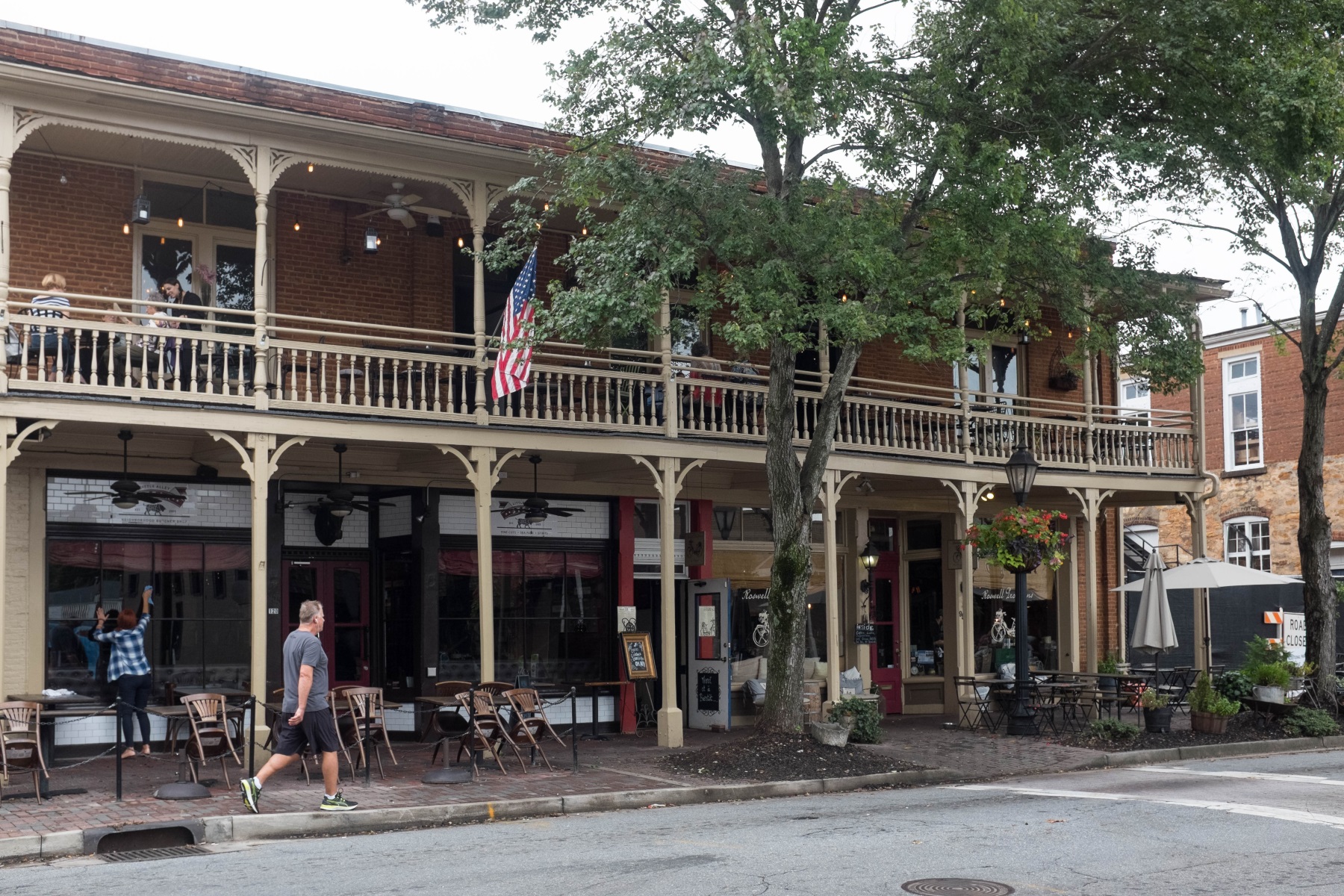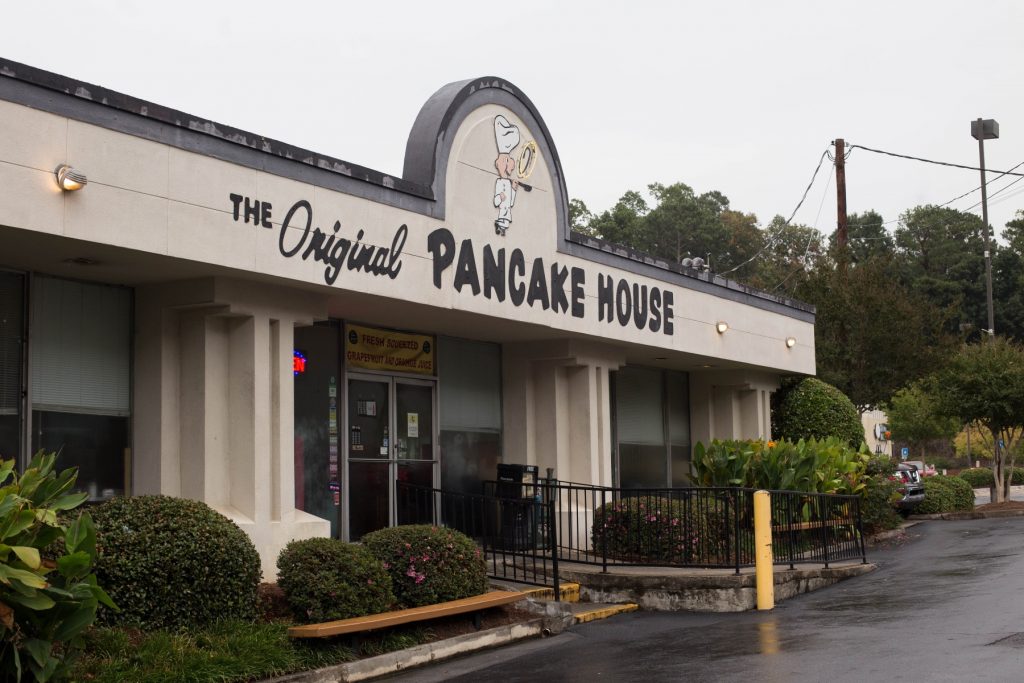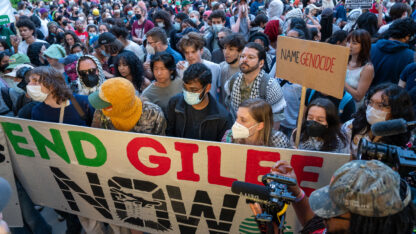How Are Filming Locations Picked In Georgia?

Picturesque downtown Roswell’s diversity, along with state subsidies, make it an ideal film location.
Ian Palmer
Downtown Roswell is a bustling square packed full of restaurants, shops and galleries. The surrounding city boasts lush parks and a rich urban landscape that positions it close enough to Atlanta to have quick access to city life but far enough out to steer clear of the hustle and bustle.
This diversity, combined with a healthy state tax incentive, makes cities like Roswell an ideal location for shooting movies and television shows. It’s also one of location manager Ethan Firestone’s favorites places to send a production crew.
Firestone got his start in location scouting by working on the movie “Selma.” Since then, he has worked on a slew of other film and television projects, including “MacGyver,” “The Accountant” and “Keeping Up with the Joneses.” He’s helped to transform the streets of Atlanta into New York City, Los Angeles and Chicago and to turn empty city parking lots into war zones in Afghanistan.
It’s Firestone’s job to know Georgia – its landscape and attractions, its highways, its small town squares – so when productions come looking for viable places to shoot, he’s ready with a few suggestions.
“My job very largely entails trying to find something that marries a creative vision and is also logistically doable,” Firestone says. “We have to be able to bring in a film crew of anywhere from 150 to 200 people — or, if it’s a bigger Marvel-type movie, 300, 350 people.”

He also has to make sure the locations he proposes have adequate parking for the entire crew, a place to put hair and makeup trailers and space for extras to get ready.
“If I find the perfect house on top of a mountain that’s exactly what a director envisioned, but it’s gravel roads all the way up, there’s no way you’d be able to get the lights and gear you need up there, the trailers, the box trucks. It doesn’t work.”
Before a project makes its way to Firestone though, production teams contact the Georgia film office and send over a screenplay or script to give the office a better idea of what the project needs.
“At the very beginning, when a movie or TV show is considering where they’re going to shoot, they’ll contact us to get some location advice,” says Craig Dominey, senior film location specialist and manager of the Camera Ready program for the state of Georgia. “We then match the locations we know of in the state to the needs of the script. We’ll give them an idea of where they might be able to best pull off their project, and then show them around to those places. Hopefully after that, we’ve landed the show.”
If Georgia is chosen, the production team will generally hire their own location managers to do the more specific, on-the-ground scouting work. That’s where Firestone comes in.
In addition to finding specific parks, restaurants or shops to film in, he also works directly with individual municipalities to iron out the details of shooting in the town or city. Each county in the state has something called a camera-ready liaison to help with permitting, parking and other legal and logistical details.
Firestone also works directly with homeowners if the project requires the use of a private residence.
“The way we approach homeowners is to knock on the door, or sometimes we’ll leave a letter during the day saying, ‘We’re interested in scouting your home. If this is something you’re interested in learning more about, please contact us at this number.’”
For the film “Keeping Up with the Joneses,” Firestone found a neighborhood and two homes on a cul-de-sac that he wanted to use for the movie.
“We put [the families] up in a hotel and gave them a per diem. We also generally negotiate a filming fee. For something that long, we’d usually just work out one total fee, with a breakdown of the prep, wrap and shoot days. People get paid more for a shoot day because that’s when the whole crew is there.”
In the past couple of years alone, Georgia has acted as the backdrop for big-budget projects like “The Avengers: Infinity War,” “Godzilla: King of Monsters,” “Baby Driver” and the Netflix series “Ozark,” helping to position the state as the top film and TV production location in the world.
“These days, Georgia is well known as a film and TV production hub,” says Dominey. “We’re [consistently] within the top three markets for filming, along with New York and LA. The word about Georgia is out.”
And with sound stages continuing to be built, an endless list of diverse shooting locations and a pool of talent locating here from all over the globe, there seems to be no limit for the continued growth of the Hollywood of the South.








